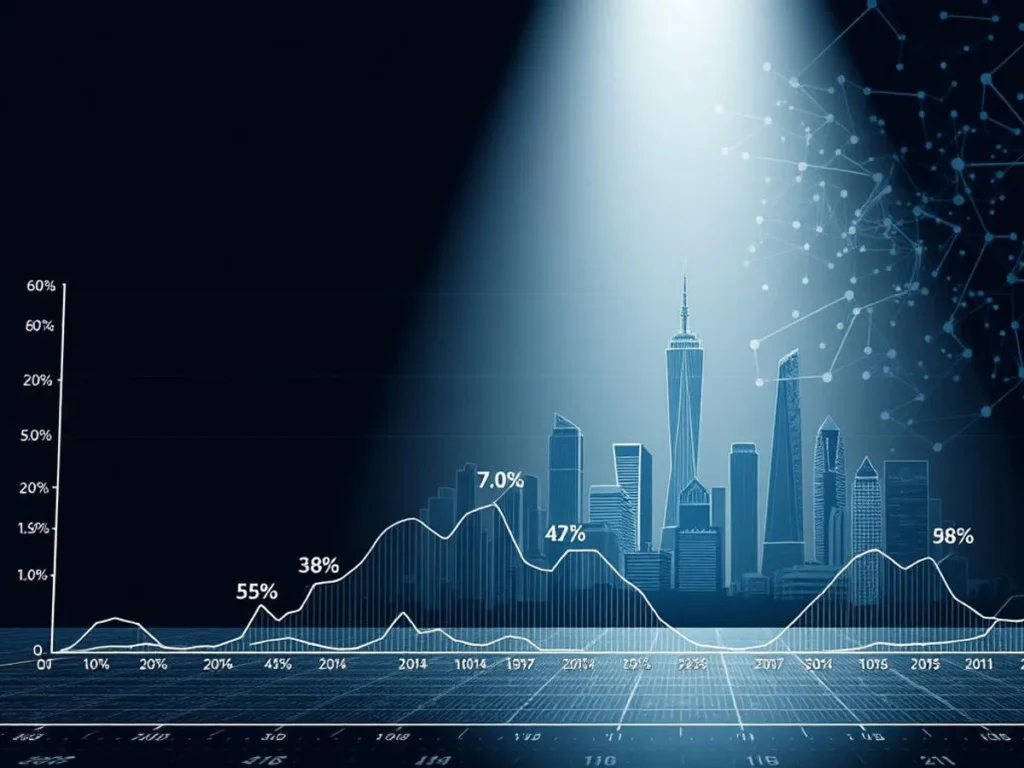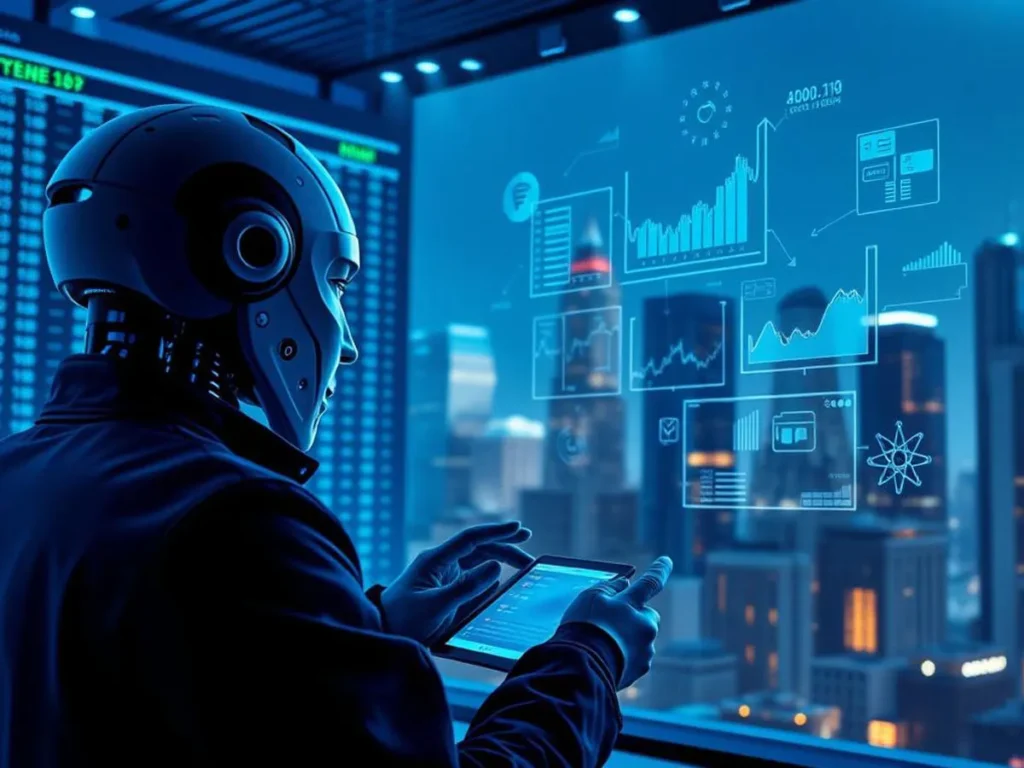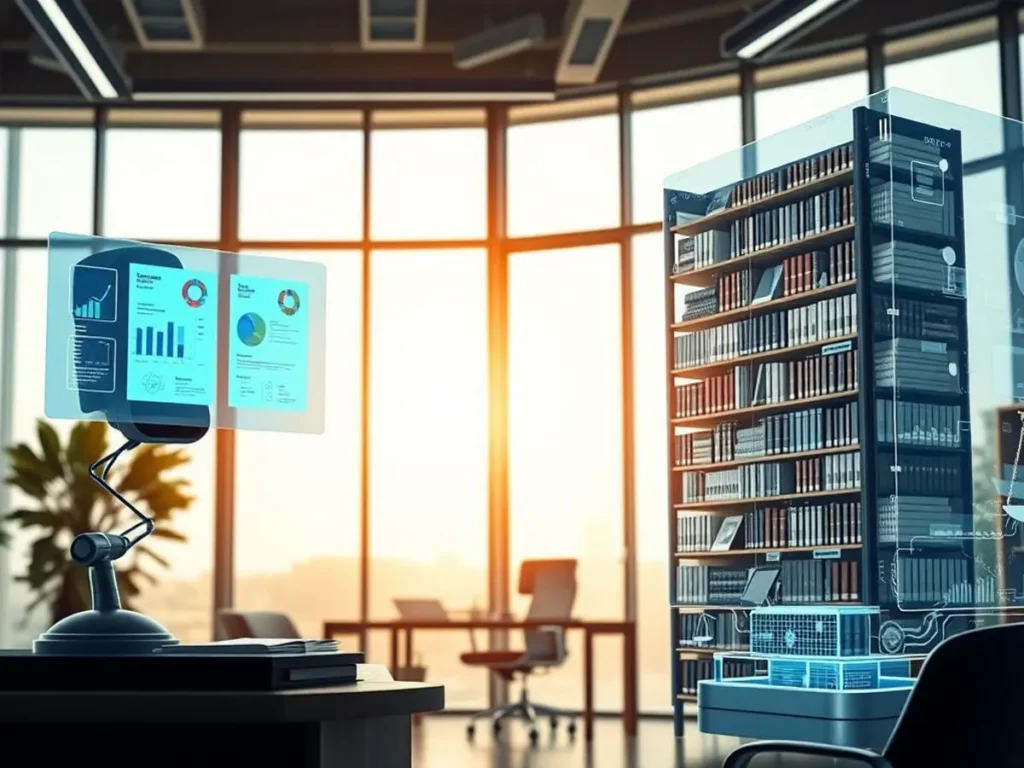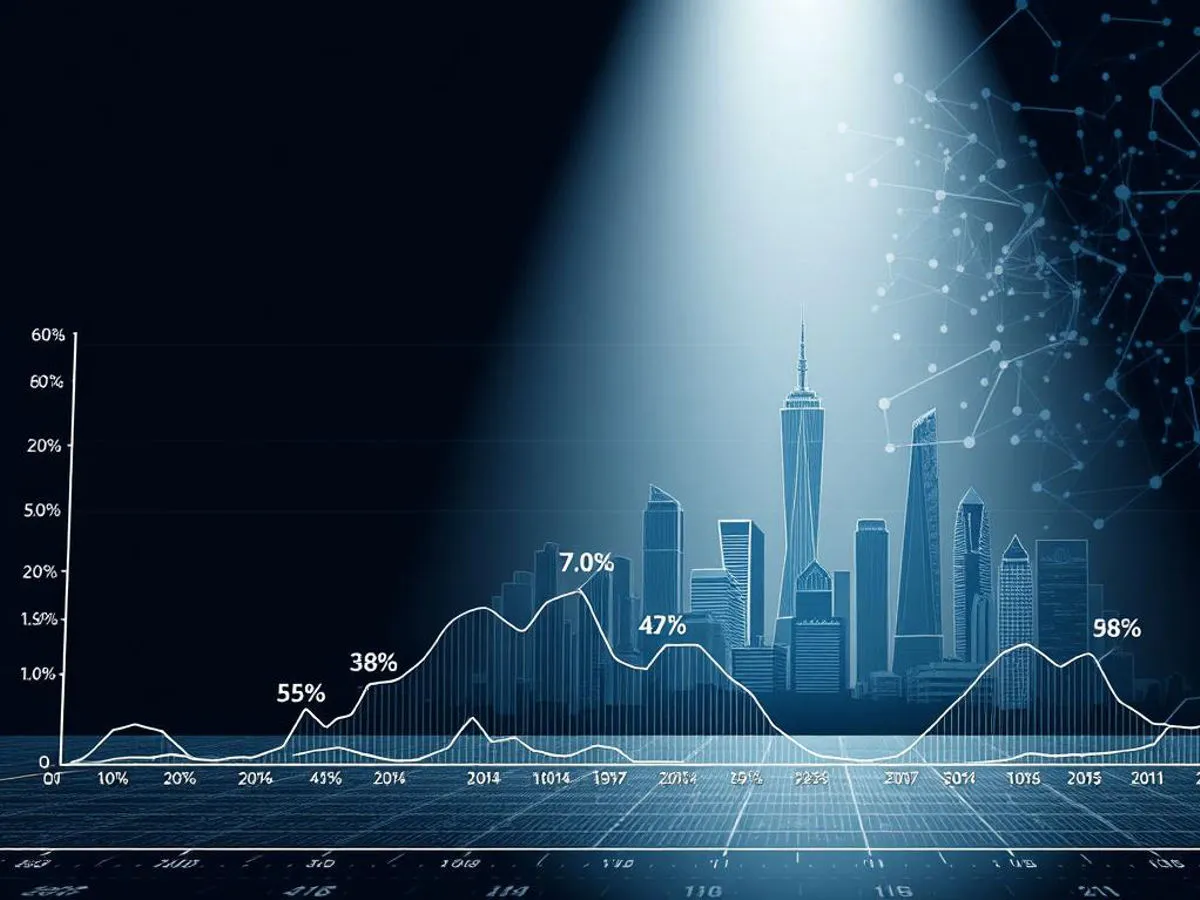Did you know that by 2025, AI could take away 85 million jobs but also create 97 million new ones worldwide? This shows that artificial intelligence’s impact on employment is both a danger and a chance. The debate over whether will AI replace jobs is more nuanced than a simple yes or no.
At the core of this change is a big question: How will artificial intelligence impact employment change industries while keeping human value? This piece looks into whether will ai replace jobs in fields like healthcare and finance. It shows where machines do well and where people’s skills are still needed. We’ll see which jobs are at risk, which will change, and how workers can adapt to work with AI.

Key Takeaways
- AI-driven job displacement could lead to a net gain of 12 million jobs by 2025.
- Industries like healthcare and education will prioritize human-AI collaboration over full replacement.
- Creativity, empathy, and strategic thinking are skills that AI cannot replicate.
- Workers must focus on blending technical skills with emotional intelligence to stay competitive.
- The future workplace will demand hybrid roles combining human judgment with AI efficiency.
The Current State of AI and Employment: Setting the Stage
AI is changing how we work, and it’s important to understand its effects. We’ll look at the data and trends that are leading this change.
Key Statistics on AI Adoption Across Industries
- Manufacturing leads, with 45% of firms using AI for automation (McKinsey, 2023).
- Healthcare AI adoption grew 30% in 2023, driven by diagnostic tools.
- Financial services invested $28 billion in AI systems last year, per Gartner.
Recent Technological Breakthroughs Accelerating AI Implementation
Big steps forward include large language models like OpenAI’s GPT-4 and NVIDIA’s AI chips. These advancements make complex tasks easier and cheaper. AI in medical imaging AI is now better than humans in some tasks.
This means companies can start using AI without a huge change. They can just add it to what they already do.
How AI is Already Changing Workplace Dynamics
Companies are training staff for new roles like AI ethics specialists and data curators. Teams use tools like ChatGPT to help with writing so they can focus on strategy. Even though technological unemployment is a worry, new jobs are being created all the time.
For example, Walmart uses AI for inventory but also hires analysts to watch over the systems. This shows how work is changing, with a focus on adapting rather than replacing jobs.
The next parts will explore how AI is affecting different industries.
Manufacturing and Production: The First Frontier of Automation
Manufacturing has always been a place where automation is tested. Now, job automation and AI are changing it fast. Factories that used to rely on people are now using AI to make things better. Studies say up to 20% of old jobs might be replaced by 2030, but new tech jobs are being created too.
Studies show that 14% of U.S. factories have AI running their production lines. AI helps manage stock, predict when machines need fixing, and check product quality. For example, tools that predict when machines will break down cut down on downtime. Vision systems also check products better than humans can.
- Predictive maintenance systems cutting repair costs by 25%
- Quality control systems flagging defects at 99% accuracy
- Supply chain AI optimizing delivery routes in real time
Companies like Siemens and General Motors are training workers to work with AI. Workers now focus on overseeing smart machines, not doing manual tasks.
The shift in manufacturing shows that AI job displacement isn’t the end. It’s about changing what we do. AI takes over simple tasks, leaving humans to innovate, solve problems, and manage complex systems. This is how the future of work is shaping up in a field that’s been using automation for a long time.
Healthcare: Will AI Replace Jobs or Enhance Medical Professionals?
AI is changing healthcare in big ways. The debate over AI vs human jobs is ongoing. But the truth is more complex. AI is changing roles, not replacing them.
AI Diagnostics vs. Human Intuition
Google Health’s mammography AI can spot breast cancer with 94% accuracy. It’s faster than doctors. But doctors bring empathy and understanding. The impact of AI on careers means that doctors have more time for patients.
Administrative Tasks Ripe for Automation
AI can handle tasks like scheduling and billing. For example:
| Task | Time Saved per Week |
|---|---|
| Medical transcription | 10–15 hours |
| Appointment scheduling | 5–8 hours |
Systems like Epic and Cerner help doctors focus on patients.
New Healthcare Roles Created by AI Advancement
New jobs are emerging:
- AI ethics officers
- Medical data curators
- AI system trainers
These roles combine medical knowledge with tech skills. AI is creating new careers, not just replacing old ones.
Creative Industries: Can Robots Really Replace Human Creativity?
Artificial intelligence tools like DALL-E and GPT-4 are changing creative work. But, can they replace human creators? AI can write articles or create visuals, but it often lacks originality and emotional depth. Let’s look at how these tools are changing art and writing and what it means for the AI job market trends in these fields.

AI Art Generation and Its Limitations
Tools like Midjourney and Stable Diffusion can mimic styles but struggle to come up with new ideas. AI art often repeats patterns without meaning. This makes people wonder if AI could replace jobs in illustration or graphic design. But, human artists are still key for creating stories and emotions.
Content Creation in the Age of GPT and Beyond
- GPT-3 and newer models can write emails, social media posts, and news articles fast.
- But they struggle with complex topics that need cultural understanding or subjective analysis.
Journalists and marketers use AI as a brainstorming aid. This has changed their roles to “AI-assisted creators.” This shift shows a trend where the job market values skills that combine AI tool use with creative thinking.
The Human Touch: What AI Cannot Replicate
Originality, empathy, and understanding of culture are unique to humans. AI can’t match the depth of human experience in storytelling. While DALL-E 3 creates amazing visuals, it can’t capture the passion of a painter or the unique voice of a writer. These differences mean creativity will always be led by humans, even as technology improves.
Transportation and Logistics: Autonomous Systems Taking the Wheel
Autonomous vehicles and AI-driven logistics are changing how we move goods and people. In the U.S., over 5 million professional drivers work in trucking, delivery, and public transit. Experts say that the impact of artificial intelligence on employment could replace up to 40% of these jobs by 2035.
Companies like Waymo and Tesla are testing self-driving trucks and delivery robots. This shows a move towards fully automated fleets.
Logistics now use AI to improve routes, predict delays, and manage warehouses. Machine learning algorithms save fuel and reduce mistakes. However, this efficiency might cost jobs.
Jobs like dispatchers and warehouse managers might change. They might watch over AI systems instead of doing manual tasks. For example, autonomous fleets need technicians skilled in robotics and data analysis. These roles didn’t exist a decade ago.
- Job displacement hotspots: Long-haul trucking, delivery drivers, and port operators
- New opportunities: AI system oversight, fleet maintenance, and cybersecurity
- Timeline: Full automation likely takes 10–15 years, with gradual implementation starting in high-risk zones like highways
While job displacement is a concern, there are ways for workers to adapt. Training in coding and robotics could help drivers move into supporting roles for autonomous systems. Cities like Phoenix and Austin are testing autonomous shuttles. This shows how infrastructure can change with technology.
Financial Services: Algorithm-Driven Decision Making
Financial services are changing fast with AI. It’s now about how money moves and how decisions are made. The future of work with AI in finance is all about finding the right balance.

Trading Floors to Server Rooms: The Shift in Financial Work
Now, over 80% of stock trades are done by algorithms. This has cut down on the need for floor traders. But humans still play a key role in managing risks and making strategies.
Goldman Sachs uses AI for quick trades. This lets staff focus on more complex tasks for clients.
Customer Service Automation in Banking
- Chatbots handle 40% of routine questions for banks like Bank of America.
- AI checks loans and finds fraud quickly.
- But, humans deal with tough issues and personal plans.
These tools make things faster but can’t replace empathy. They’re not good for sensitive topics like debt advice.
Financial Advisors in the AI Era
Robo-advisors like Betterment manage big parts of portfolios. However, human advisors are still crucial. They use AI insights to help clients with their goals and life events.
Fidelity says advisors now spend less time on data entry. They can focus more on building trust and planning for clients’ futures.
The job automation and AI trend in finance isn’t about getting rid of jobs. It’s about changing what jobs do. Now, people focus on creativity, ethics, and connecting with clients.
Will AI Replace Jobs in Education and Training?
AI tools are changing education, but the debate on AI vs human jobs is ongoing. Sites like Duolingo and Coursera use algorithms to make learning more personal. They also have grading systems like Gradescope that automate checks.
These tools help teachers by doing the boring work. This lets them focus on helping students and being creative.
- AI tutors provide 24/7 support for math and language practice
- Chatbots handle student inquiries about schedules and resources
- Data analytics track learning progress in real time
A study by the Brookings Institution found that 35% of U.S. teachers use AI for planning. But, they say human teachers are key for emotional support and thinking critically. Despite worries about technological unemployment, research shows students do best with a mix of AI and human help.
Teachers are now more like “learning architects.” They design lessons, not just teach. This shift helps students learn better.
Corporate training sites like LinkedIn Learning and Udemy use AI for professional growth. But, human trainers are still needed for leadership and ethics. The World Economic Forum believes 65% of education jobs will change, not disappear, by 2030.
AI does the routine work, freeing teachers to encourage creativity and build relationships. These are things machines can’t do.
Legal and Administrative Professions: AI Paralegals and Virtual Assistants
AI is changing legal and administrative work a lot. It automates routine tasks, freeing up time for more important decisions. This change shows how AI impacts careers, and the AI job market trends are shifting towards skills that adapt well.

Document Review and Research Automation
AI tools like Kira Systems and LawGeex can review contracts and legal documents with 95% accuracy. They cut down review time by up to 40%. These tools do tasks that used to take hundreds of hours, freeing up time for humans to meet with clients and plan strategies.
Case Prediction and Risk Assessment
Predictive analytics tools, like ROSS Intelligence, analyze old case law to predict outcomes. A 2023 Stanford study found these tools are right 85% of the time. This helps lawyers advise clients better on settlement ranges and risks.
Jobs Becoming Enhanced Rather Than Replaced
Jobs are changing into new hybrid roles. New positions include:
- Legal technologists who manage AI tools and train teams
- Compliance officers who make sure AI decisions are fair
- Client strategists who use data to create custom legal plans
These changes fit with AI job market trends towards working with AI. Paralegals now focus on client relations while AI handles data tasks. This shows that the impact of AI on careers is about diversifying skills, not just replacing jobs.
Skills That Will Remain Valuable in an AI-Dominated Workforce
As will AI replace jobs is a big topic, the future of work with AI depends on what humans do best. Here are the skills that will keep careers strong:
- Complex Problem-Solving: AI is great at finding patterns but can’t handle unclear or new problems. Leaders who can handle the unexpected will always be needed.
- Creative Synthesis: AI can make art and content, but humans bring emotion, culture, and new ideas. These are key for telling stories and coming up with new things.
- Emotional Intelligence: Being able to understand and connect with others is something only humans can do. Jobs that need trust, guidance, or solving conflicts rely on this skill.
- Ethical Judgment: Making fair choices in healthcare, law, and policy needs human values. Machines can’t learn ethics like humans do.
- Adaptive Learning: Being able to quickly learn new skills and keep learning is important. It helps workers keep up with AI tools.
A 2023 report by the World Economic Forum shows the future of work with AI trends: 97 million new jobs worldwide by 2025 will need these skills. Learning to work with AI, like training and strategy, is also key. Focus on growing these abilities while learning to use AI tools well. The future workforce will be made up of people who can mix human skills with tech knowledge.
Conclusion: Preparing for a Future Where Humans and AI Coexist
AI is changing work and making some jobs obsolete. But, not all jobs are at risk. Jobs in healthcare and education still need their human touch.
History shows that new jobs come after old ones disappear. This is true for the Industrial Revolution and the rise of computers. So, we should be ready for new chances.
We need to work together to handle these changes. Governments and companies should help people learn about AI and important skills. We should focus on what machines can’t do, like empathy and leadership.
By seeing AI as a partner, we can make a better future. We can use technology to make work easier and more productive. Taking action now will help us turn this change into a positive step forward.
Table of Contents
FAQ
Will AI replace jobs in every industry?
AI will likely change many industries, but it won’t replace all jobs. Some jobs are more at risk of being automated. Yet, other jobs will need skills that AI can’t do. The impact of AI on jobs is complex and varies by industry.
How is AI currently affecting employment?
AI is changing job roles and creating new ones. It automates some tasks but also brings new jobs. This shows a shift, not a complete replacement of jobs.
Are there jobs that AI cannot replace?
Yes, jobs that need complex problem-solving, emotional intelligence, and creativity are less likely to be automated. These skills are key in many professions, showing the value of human abilities alongside AI.
How can workers prepare for a future with AI?
Workers should focus on skills that complement AI, like emotional intelligence and creativity. They should also keep learning and adapting to new technologies. Embracing lifelong learning and finding roles that use human strengths is crucial.
Is technological unemployment a permanent issue?
Technological unemployment might not last forever. History shows that labor markets can adjust. As some jobs are automated, new ones emerge, and workers can move to different roles. But, this transition takes time and may need efforts from individuals and governments.
How likely is it that AI will enhance rather than replace jobs?
Many experts think AI will boost productivity and help human workers, not replace them. For example, in healthcare, AI can help with diagnostics but can’t replace the care and empathy that humans provide.
What can be done to mitigate the impact of AI job displacement?
To lessen AI’s job displacement impact, we need education reform, upskilling programs, and social safety nets like universal basic income. These can help workers adapt to new job roles as the market changes.


I do not even understand how I ended up here, but I assumed this publish used to be great
Thanks for sharing. I read many of your blog posts, cool, your blog is very good.
Thanks for sharing. I read many of your blog posts, cool, your blog is very good.